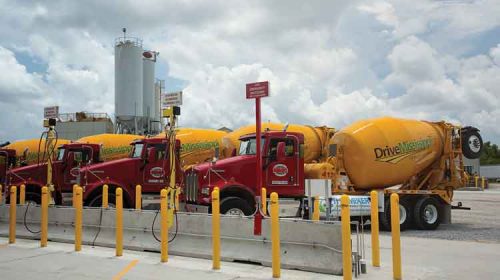Madison, Miss.-based MMC Materials Inc. has rolled out the Southeast’s first compressed natural gas-powered concrete mixer fleet, ramping up for delivery of 12 McNeilus Ngen (Next Generation Initiatives) models with the installation of a TruStar Energy Portable Fuel Station (PFS). The natural gas compressor and related infrastructure are suitably scaled to the company’s Jackson plant, where drivers conclude their work day hooking up trucks for overnight refueling.
“We became interested in this from an environmental standpoint and began looking at it over a year ago,” says MMC Central Region Vice President Stanley Mangum, noting that discussions with refuse haulers running CNG vehicles boosted the company’s confidence in the diesel fuel alternative. “We knew we could use CNG that’s made right here at home, and given the price difference between natural gas and diesel, it adds up quickly.
“This continues our tradition of industry leadership, already evidenced by NRMCA Green-Star plants around Mississippi—the only ones with that certification in the state,” he adds. “We hope our fueling station can be a resource to other businesses looking to invest in clean technology. This move also benefits customers who are working on LEED building projects since materials delivery is one of the components considered for certification.”
MMC has invested $1 million on the CNG project—a major outlay, company officials affirm. They estimate a three- to five-year return on investment, as the CNG trucks can exhibit fuel economy of 6.5 to 7 diesel equivalent mpg versus the 4 to 4.5 mpg conventional diesel trucks achieve.
Natural gas burns cleaner than conventional gasoline or diesel fuel due to its lower carbon content, while CNG-powered vehicles impart no evaporative emissions since their fuel systems are completely sealed, notes MMC Safety and Environmental Officer David Bosarge. “In converting our truck fleet to CNG, MMC is investing in the future, saving on fuel costs, contributing to our energy independence, and helping the environment,” he says. “Each vehicle will refuel overnight at the terminal and should be able to run a full day’s work before needing a refill.”
“We designed and built the PFS for exactly these types of fleets,” adds TruStar Energy Vice President Scott Edelbach. “We knew that some fleet owners needed a portable fueling solution that offered compressor redundancy for reliability, but also a system that was appropriately sized for smaller operations.”
MMC’s new Kenworth-mounted mixers run 12-liter Cummins-Westport ISX G engines, introduced earlier this year as a larger offering to the ISL-G—a power package specified on pre-2013 CNG mixers. The producer will measure CNG versus diesel fuel savings plus driver productivity improvements for 12 months then determine the next steps for a Mississippi fleet of 300-plus mixers.
— TruStar Energy LLC, Fontana, Calif., 909/793-3700; www.trustarenergy.com
